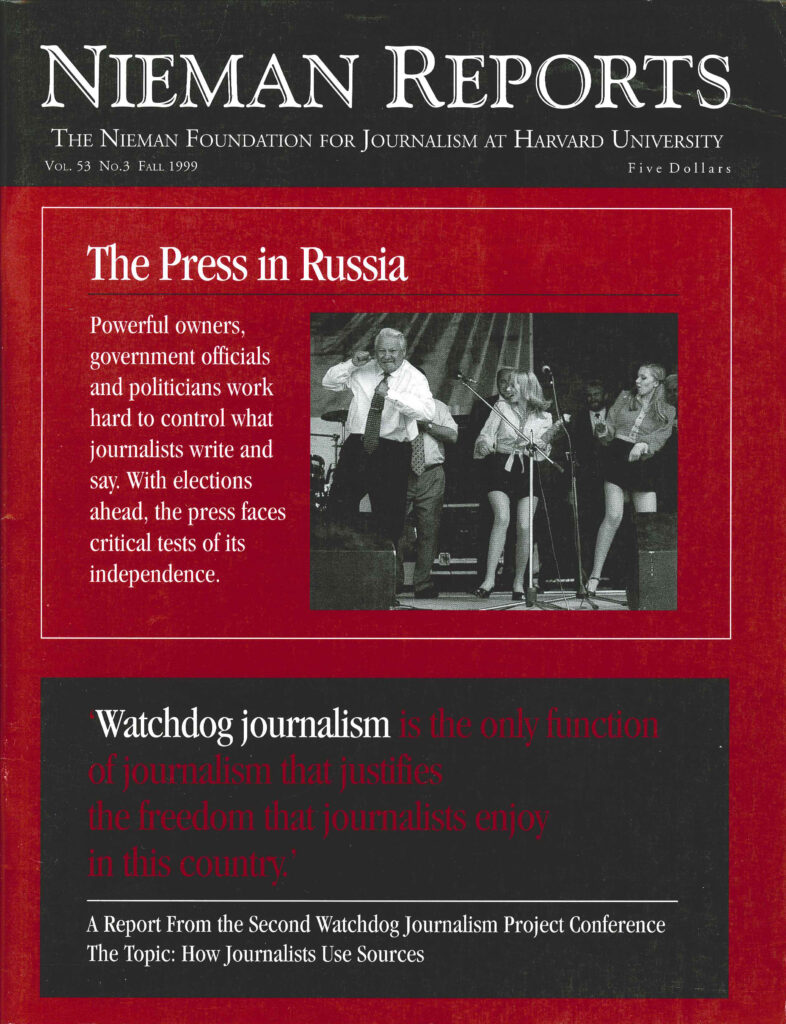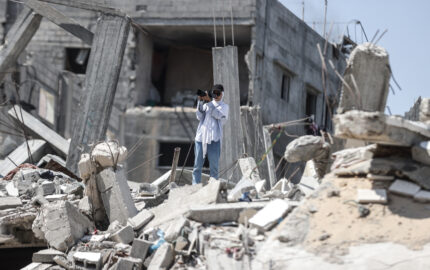From Russia—
Yevgenia Albats, an independent journalist in Russia, describes what it is like to try to be an investigative journalist in Russia amid forces—applied by both government and business—that work to make this kind of enterprising reporting less and less possible. As she writes, “media outlets become controlled by the elite and powerful who don’t want their power and prosperity to be threatened.” The consequence: For journalists such as Albats, there are fewer and fewer publications that will print what they report.
Two other perspectives on what is happening to the Russian media come from professors who have closely observed changes during the past few years. Ellen Mickiewicz, the author of “Changing Channels: Television and the Struggle for Power in Russia,” and Director of the DeWitt Wallace Center for Communications and Journalism at Duke University, echoes many of Albats’s observations as she examines what is broadcast as news on Russian television, who controls the decision-making and how viewers respond. Then, Virginie Coulloudon, a former French journalist who directs the research project “The Elite and Patronage in Russia” at the Davis Center for Russian Studies at Harvard University, expands our look at the media in Russia by assessing the situations faced by local regional news outlets. Her conclusion: Russia’s 1998 financial crisis provided an opening for powerful provincial leaders to assume greater control over local newspapers. She writes that, “One thing is certain: The local political leadership will try to assert greater control over the press in an attempt to secure their governing positions.”
About China—
Webster K. Nolan, the former Director of the East-West Center Media Program in Honolulu and a frequent visitor with journalists in China, describes the rapidly changing circumstances for Chinese journalists. Marketplace pressures, such as the unstoppable increase in advertising, are a force that editors must now consider in deciding what to cover and how to report it. Nolan compares much of what is happening now in China to similar trends taking place in U.S. journalism. He finds similarities but also points out contrasts that are rooted in political and cultural differences.
From Spain—
Dale Fuchs, who is reporting in Spain while on a Fulbright Fellowship for journalists, explains why that country’s reporters are so “starry-eyed” in their coverage of the euro. While reporters in other European countries include in their coverage some skepticism about the new single European currency, Spanish journalists rarely touch on this aspect of the story. Fuchs helps us understand why press coverage in Spain is so different.
Yevgenia Albats, an independent journalist in Russia, describes what it is like to try to be an investigative journalist in Russia amid forces—applied by both government and business—that work to make this kind of enterprising reporting less and less possible. As she writes, “media outlets become controlled by the elite and powerful who don’t want their power and prosperity to be threatened.” The consequence: For journalists such as Albats, there are fewer and fewer publications that will print what they report.
Two other perspectives on what is happening to the Russian media come from professors who have closely observed changes during the past few years. Ellen Mickiewicz, the author of “Changing Channels: Television and the Struggle for Power in Russia,” and Director of the DeWitt Wallace Center for Communications and Journalism at Duke University, echoes many of Albats’s observations as she examines what is broadcast as news on Russian television, who controls the decision-making and how viewers respond. Then, Virginie Coulloudon, a former French journalist who directs the research project “The Elite and Patronage in Russia” at the Davis Center for Russian Studies at Harvard University, expands our look at the media in Russia by assessing the situations faced by local regional news outlets. Her conclusion: Russia’s 1998 financial crisis provided an opening for powerful provincial leaders to assume greater control over local newspapers. She writes that, “One thing is certain: The local political leadership will try to assert greater control over the press in an attempt to secure their governing positions.”
About China—
Webster K. Nolan, the former Director of the East-West Center Media Program in Honolulu and a frequent visitor with journalists in China, describes the rapidly changing circumstances for Chinese journalists. Marketplace pressures, such as the unstoppable increase in advertising, are a force that editors must now consider in deciding what to cover and how to report it. Nolan compares much of what is happening now in China to similar trends taking place in U.S. journalism. He finds similarities but also points out contrasts that are rooted in political and cultural differences.
From Spain—
Dale Fuchs, who is reporting in Spain while on a Fulbright Fellowship for journalists, explains why that country’s reporters are so “starry-eyed” in their coverage of the euro. While reporters in other European countries include in their coverage some skepticism about the new single European currency, Spanish journalists rarely touch on this aspect of the story. Fuchs helps us understand why press coverage in Spain is so different.



